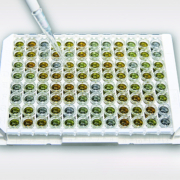ELISA for urinary sCD163 measurement
Urinary soluble CD163 (sCD163) is a novel non-invasive marker of renal inflammation, and its determination supports early detection and monitoring of active glomerulonephritis (GN). Studies by experts in the field led by Prof. Mark Little (Trinity College, Dublin, Ireland) showed that significantly increased sCD163 levels in urine are present in up to 87% of patients with active ANCA-associated vasculitis (AAV) with renal involvement. In contrast, only slight increases are detected in AAV patients in remission, patients with acute kidney failure or sepsis, and patients with AAV without kidney involvement (O’Reilly et al. Am Soc Nephrol 27: 2906–2916, 2016). Furthermore, urinary sCD163 is elevated in patients with non-vasculitic forms of GN, especially in patients with lupus nephritis class IV (Endo et al. J Nephrol Dial Transplant. 31(12): 2023-2033, 2016). sCD163 is a macrophage activation marker. The sCD163 level in urine correlates directly with the kidney disease activity, reflecting the accumulation of CD163+ macrophages in the glomeruli in response to pro-inflammatory stimuli. The direct correlation with renal inflammation means that urinary sCD163 is superior in performance to standard urinary markers, which have limited value in identifying a renal relapse. Monitoring of urinary sCD163 values can help to predict renal flares before irreversible kidney damage occurs and might enable invasive kidney biopsies to be avoided. sCD163 can be measured quantitatively in urine samples using a new ELISA from EUROIMMUN. The detection is based on monoclonal anti-sCD163 antibodies. Values are determined by means of a simple cut-off-based interpretation using 6 calibrators. The EUROIMMUN sCD163 ELISA will soon be available as IVD CE-marked assay.



